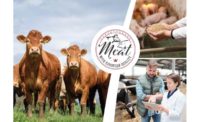The Food and Drug Administration’s annual report tracking sales of antibiotics for livestock finds that medically important antibiotic sales related to meat production increased by 4% between 2021 and 2022, reversing years of declining use.
Domestic sales and distribution of medically important antimicrobials approved for use in food-producing animals decreased by 36% from 2015 (the year of peak sales) through 2022.
The FDA report said pigs account for 43% of livestock antibiotic sales, cattle 41%, turkeys 12% and chickens 2%.
Niman Ranch, a network of more than 600 independent family farmers and ranchers that raise pork, beef and lamb without antibiotics, issued the following statement in response to the FDA report.
“As a longtime leader in the no antibiotics ever sector, it is dispiriting to see the use of medically important antibiotics on the rise for livestock production,” said Chris Oliviero, general manager of Niman Ranch. “This is a concerning trend for both human and animal health, as antibiotic-resistant superbugs become an increasing threat.”
Raising livestock without antibiotic overuse is paramount to the future efficacy of these life-saving drugs, and reducing the world health crisis of antibiotic resistance, Oliviero said.
“The Niman Ranch network of over 600 independent family farmers and ranchers prove every day that routine antibiotic use is not necessary when animals are provided a low-stress environment with extra space, fresh air and humane animal care,” he said.
In July, the U.S. Department of Agriculture’s Animal and Plant Health Inspection Service announced 12 awards totaling more than $3.2 million in cooperative agreement funding to create antimicrobial resistance dashboards.
Antimicrobial resistance is a public health concern as well as a threat to food safety that is aggravated by the use of antimicrobials in food-producing livestock.
In September, FDA released an updated five-year action plan for supporting antimicrobial stewardship in veterinary settings. The plan from the FDA's Center for Veterinary Medicine focused on aligning antimicrobial drug product use with the principles of antimicrobial stewardship, fostering antimicrobial stewardship on veterinary settings and enhanced monitoring of antimicrobial resistance and use in animals.
Sales of veterinary medicines across Europe dropped by 53% between 2011 and 2022, which regulators reported is the biggest drop ever recorded.

.png?height=96&t=1647275041&width=96)

Report Abusive Comment